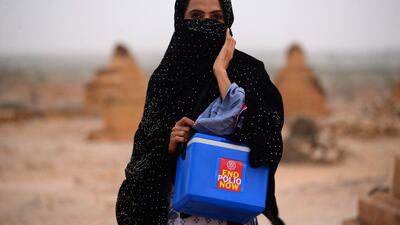In the past 18 months, the virus that most gripped the world's attention has not been the polio virus. Yet, even during the course of the Covid-19 pandemic, polio has remained a threat in a few remaining parts of the world.
The paralysing disease afflicts spinal cords of children aged 5 and younger. Regions need to be constantly monitored so that cases don't re-appear. As infectious as the virus is infamously known to be, the campaign to rid the world of it, had been halted for 18 months due to the pandemic. Pakistan and Afghanistan remain the last two countries with endemic polio.
Today, as another World Polio Day is marked, an occasion arises to evaluate the gains made globally and the work that remains – including, crucially, battling misinformation and vaccine hesitancy – to meet the end goal set 30 years ago, of eradicating the disease.
Over the years, the UAE has delivered financial support and made enormous efforts towards this end, with Sheikh Mohamed bin Zayed, the Crown Prince of Abu Dhabi and Deputy Supreme Commander of the Armed Forces, having pledged more than $250 million since 2011.
Last July, amid the pandemic, the UAE became the first country to resume the polio vaccination programme, supporting door-to-door campaigns in Pakistan, where 12 million children have already benefited. On Saturday, the World Health Organisation said the UAE had boosted Pakistan's fight with funds to the tune of $23m.
Polio eradication is one of those missions that exemplifies what is possible when countries champion global concerns and join other stakeholders to deliver a common vision – goals grow within reach.
Since 1988, progress in this regard has been significant and measurable. According to the WHO, wild poliovirus cases decreased by over 99 per cent – from an estimated 350,000 cases in more than 125 endemic countries in 1998 to 175 reported cases in 2019. Such landmark numbers are the outcome of joint efforts and teamwork headed by the Global Polio Eradication Initiative, led by national governments, WHO, Unicef, and among others, the Bill & Melinda Gates Foundation and Gavi, the Vaccine Alliance.
Two of the three strains of wild poliovirus (type 1, 2 and 3) have been eradicated. The world can be close to putting the lid on the disease for good if type 1 is eradicated. As of 2020, it continues to affect the neighbouring countries of Pakistan and Afghanistan.
After years of progress in Afghanistan – where they managed to keep a check on polio infections – the trend in the past two years has been worrisome. Due to violence and unrest, cases have surged. This is an ominous sign not just for the country and its 3.3 million children in need of the vaccine; as we've seen with the coronavirus, infections don't conform to borders and geographies. Children everywhere – who have not been inoculated – are at risk of contracting the disease, unless all parts of the world are 100 per cent polio free.
In a positive development that, however, needs to be viewed with a measure of scepticism, this week the Taliban said it will not impede the inoculation campaign, which is set to pick up pace from November. This is at least a step in the right direction because of the incidents of violence earlier in the year – three women medical workers were killed in Jalalabad as they went about doing their duties of administering polio drops in the eastern parts of the country. Such cases of violence are tragic on their own but they also rob any fragile headway made in global health campaigns. Polio eradication efforts must be allowed to continue safely until every child has been inoculated, their chances of healthy futures massively increased.
To this end, and not just in areas of strife, the contributions of donor countries and the pledges of stakeholders are a lifeline to the larger goal of ensuring that all children in all parts of the world can live healthy, polio-free lives.


